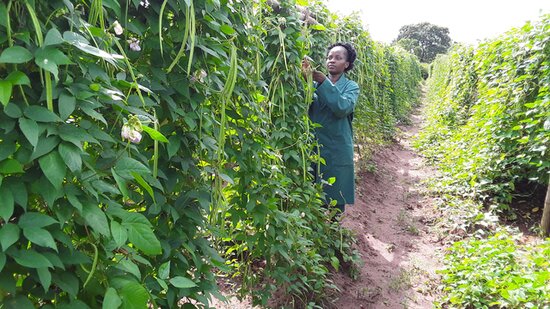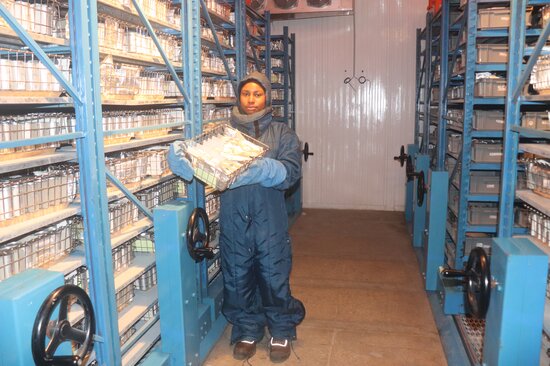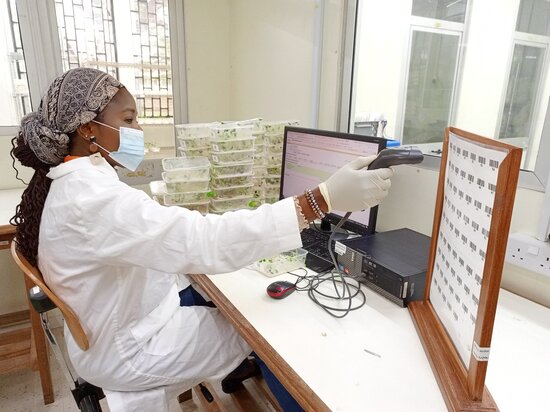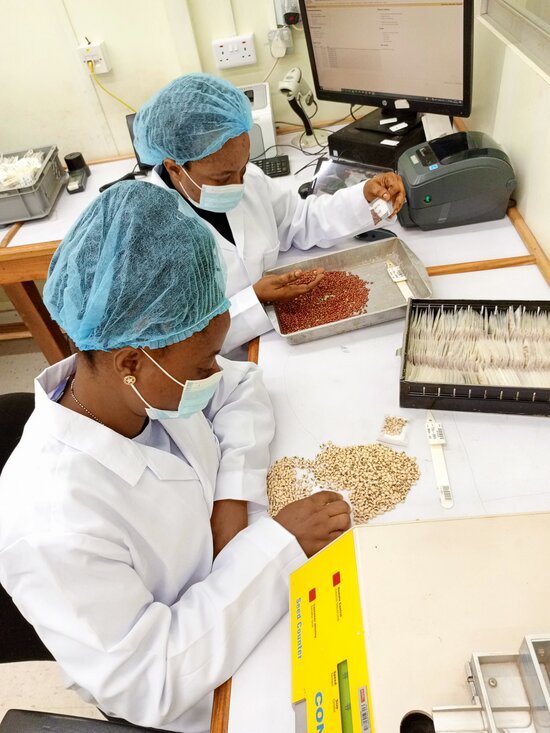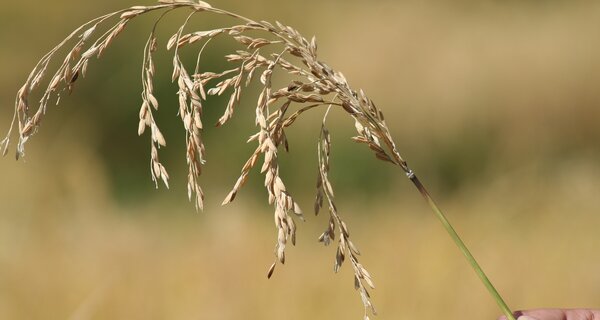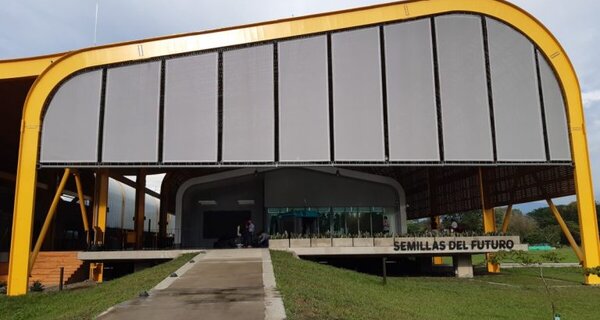Lasting Support Guaranteed for the Conservation of Sub-Saharan Africa’s Crop Diversity
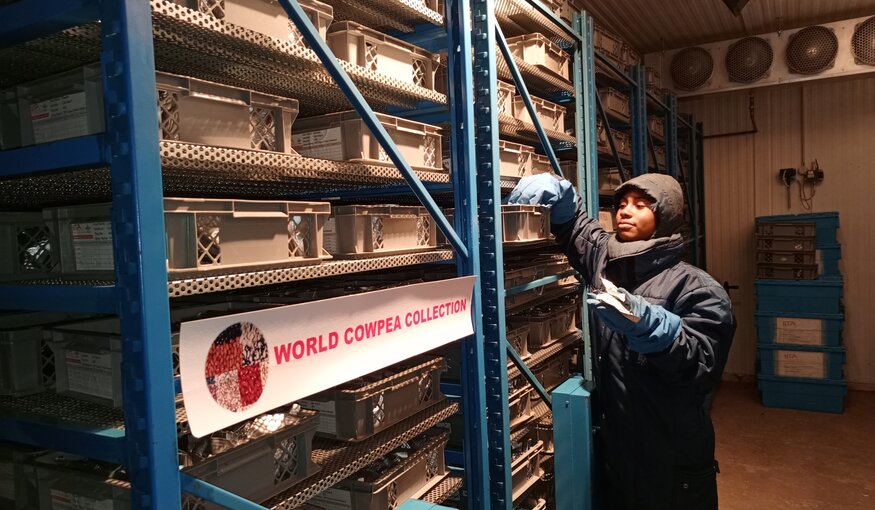
IITA's genebank, Genetic Resources Center, houses the world’s largest collection of cowpea. Photo: Tchamba Marimagne/IITA
Dar es Salaam, Tanzania, 7 September 2023 – The future of some of Africa’s most beloved staple crops, including important legumes, will be secured this week, following the signing of a Long-term Partnership Agreement between the Crop Trust and CGIAR Research Center, International Institute of Tropical Agriculture (IITA), at the Africa Food Systems Summit.
Through this landmark partnership, the Crop Trust commits to providing a guaranteed source of funding for IITA’s genebank, the Genetic Resources Center, in perpetuity. This funding will cover the essential operations needed for the conservation and distribution of over 36,000 varieties of key sub-Saharan African food crops, such as maize, Bambara groundnut and African yam bean, including the world’s largest collection of cowpea.
Over 70% of the collection originates from 40 African countries, with the rest hailing from various other corners of the globe.
Cowpea and maize are staple crops that provide protein and carbohydrates and are widely cultivated in Africa. Bambara groundnut and African yam bean are underutilized indigenous African legumes which are climate resilient, nutritionally rich and a mainstay of smallholder farmers. The vast diversity in these crop collections is ‘mined’ by plant breeders and researchers for climate resilience and stress tolerance to adapt African agriculture to future conditions.
Indigenous African legumes are major sources of nutrition, particularly protein, for low-income populations. No improved varieties of Bambara groundnut and African yam bean are available and so production is dependent on landraces. These can disappear from farmers’ fields, but can be returned to cultivation if conserved in genebanks and made available for distribution to farmers.
Complementary funding for the partnership will come from the CGIAR Initiative on Genebanks and the Bill & Melinda Gates Foundation. IITA itself will provide matched funding.
Long-term Partnership Agreements such as this one are funded through the Crop Diversity Endowment Fund, which is managed by the Crop Trust. This endowment fund provides guaranteed long-term financial support to key genebanks worldwide, including covering a part of the operational costs of the Svalbard Global Seed Vault.
Previous signatories include two other CGIAR Research Centers: The Alliance of Bioversity International and CIAT (International Center for Tropical Agriculture), signed earlier in 2023, and the International Rice Research Institute (IRRI), in 2007.
The Crop Trust, the primary financial mechanism to help reach Sustainable Development Goal 2.5, on the conservation of the genetic diversity of crops, seeks to grow its endowment fund to be able to support more globally important collections of crop diversity in the future.
Stefan Schmitz, Executive Director of the Crop Trust, and Simeon Ehui, the incoming Director General of IITA, welcome the attendees of the Africa Food Systems Summit to take part in the signing of the agreement on 7 September 2023 at 16:00 GMT+3.
Stefan Schmitz, Crop Trust Executive Director said:
“We are delighted to be signing a Long-term Partnership Agreement with IITA today, which is a testament to the extraordinary staff and work of the Institute, and of its Genetic Resources Centre more specifically. We are proud of the instrumental role the Crop Trust is playing to ensure this work continues. This is only possible, thanks to the unwavering support of the many donors to our endowment fund since its inception almost 20 years ago. Crop diversity conservation is key to guaranteeing food security in the face of the climate crisis, which is threatening food supplies around the world. Genebanks like IITA’s Genetic Resources Centre must be equipped with the resources needed to succeed, which means more investment is needed to support the crucial role of genebanks in transforming our agri-food systems. I look forward to continuing this dialogue at the Global Crop Diversity Summit taking place in Berlin, Germany, in November 2023.”
Simeon Ehui, CGIAR Director for Africa and Director General for the International Institute of Tropical Agriculture, said:
“As I step into my new roles at CGIAR as Director for Africa, and IITA, as Director General, it is stimulating to see the level of excellence my Genetic Resources Center colleagues have reached through the years. Signing this partnership with the Crop Trust is a groundbreaking moment for IITA. It guarantees we will be able to continue our critical work, ensuring the longevity of key crops such as cowpea, Bambara groundnut, and African yam bean and helping build towards a food-secure future for sub-Saharan Africa and beyond.”
Lindiwe Majele Sibanda, System Board Chair for CGIAR, said:
“We are delighted that One CGIAR Research Centers are continuing to build partnerships to help secure the agrobiodiversity we need to feed the world. As growing conditions change under climate change, genetic materials stored in our genebanks offer scientists a library of material from which they can develop crop varieties that are, for example, resilient to drought or have increased nutritional properties.”
Notes to the Editor
About the Crop Trust
The Crop Trust is an international organization working to conserve crop diversity and thus protect global food and nutrition security. At the core of Crop Trust is an endowment fund dedicated to providing guaranteed long-term financial support to key genebanks worldwide. The Crop Trust supports the Svalbard Global Seed Vault and coordinates large-scale projects worldwide to secure crop diversity and make it available for use, globally forever and for the benefit of everyone. The Crop Trust is recognized as an essential element of the funding strategy of the International Treaty on Plant Genetic Resources for Food and Agriculture. Learn more at www.croptrust.org.
About the International Institute of Tropical Agriculture (IITA)
IITA is one of the 12 international agricultural research centers that are members of the CGIAR Consortium. It was established in 1967 in Ibadan, Nigeria. IITA’s mission is to assure food security for some of the world’s poorest people and provide them with viable strategies that create real, long-term results for economic development and community stability, while building an ecologically sound future that takes into account the issues of climate change. IITA is dedicated to alleviating these problems and working to transform agriculture in Africa. Learn more at https://www.iita.org.
About CGIAR
CGIAR is a global research partnership for a food-secure future. CGIAR science is dedicated to reducing poverty, enhancing food and nutrition security, and improving natural resources and ecosystem services. Its research is carried out by 12 CGIAR Research Centers in close collaboration with hundreds of partners, including national and regional research institutes, civil society organizations, academia, development organizations and the private sector. Learn more at www.cgiar.org.
Categories: For The Press, Press Releases, Genebanks, Beans, Temperate forages

